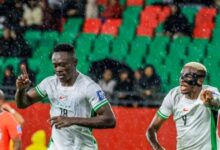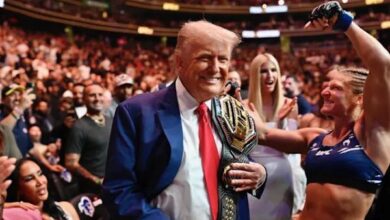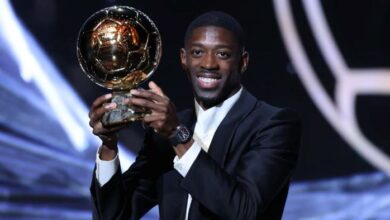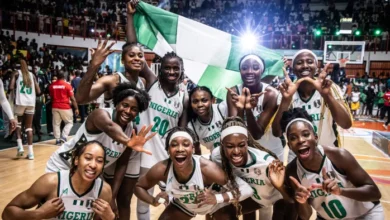World Cup Playoffs: Super Eagles Open Camp in Rabat as 10 Players Arrive Early for Final Push

Nigeria’s quest to reclaim its place on football’s biggest stage — the 2026 FIFA World Cup — officially kicked off on Sunday as the Super Eagles’ camp opened in Rabat, Morocco, with ten early arrivals.
The team checked into Rive Hotel, Rabat, under the watchful eyes of the coaching crew and technical officials, signaling the start of what promises to be a decisive week in Nigeria’s campaign for qualification.
Team Media Officer Promise Efoghe confirmed that early arrivals include Calvin Bassey, Alex Iwobi, and Samuel Chukwueze, alongside Tolu Arokodare and Olakunle Olusegun. Later in the day, Wilfred Ndidi, Moses Simon, and William Troost-Ekong joined the squad, while Benjamin Fredericks and Chidozie Awaziem checked in by nightfall — bringing the total to 10 players in camp.
With more players expected to arrive before Monday’s full training session, the atmosphere in camp already reflects determination and unity as Nigeria prepares for Gabon in Thursday’s first playoff clash.
Nigeria’s Road to Redemption: A Defining Moment for the Super Eagles
For Nigeria, these World Cup playoffs represent more than a qualifying round — they’re a redemption mission after a disappointing miss in 2022. The Super Eagles enter the playoff stage as the highest-ranked team among the four African contenders, facing Gabon in the semifinal before a potential showdown with either Cameroon or DR Congo on November 16, also in Rabat.
Victory in both ties would earn Nigeria a continental playoff berth, followed by a final intercontinental qualifier in March 2026, to be hosted in Mexico, where Africa’s representatives will battle for a spot in the expanded World Cup.
Head coach Eric Chelle has assembled a formidable 24-man squad featuring a blend of seasoned internationals and in-form youngsters, many of whom are hitting peak form in Europe’s top leagues.
Chelle’s Tactical Blueprint: Blending Youth, Experience, and Resilience
Chelle’s team selection underscores his intention to combine tactical structure with attacking dynamism, while reinforcing defensive stability — a weakness that haunted Nigeria in earlier qualifiers.
The return of Maduka Okoye (Udinese) bolsters the goalkeeping department, while Awaziem adds defensive solidity. In midfield, Raphael Onyedika and Wilfred Ndidi are expected to anchor transitions, freeing creative minds like Alex Iwobi and Frank Onyeka to dictate tempo.
Up front, the strike force led by Victor Osimen, Samuel Chukwueze, and Ademola Lookman is capable of dismantling any defence on the continent. Moses Simon and Olakunle Olusegun will provide pace and width, with Akor Adams and Tolu Arokodare offering physical presence and aerial threat.
“Nigeria may be favourites on paper, but this stage of World Cup qualification demands more than talent. It demands discipline, tactical precision, and mental sharpness,” Chelle cautioned during his pre-camp briefing.
BRANDECONOMY ANALYSIS: Why This Playoff Defines Nigeria’s Football Future
This playoff run carries strategic implications for Nigeria’s football ecosystem — from squad rebuilding and brand revival to fan confidence and commercial visibility ahead of the 2026 World Cup.
The Super Eagles’ global appeal has historically been tied to World Cup appearances — tournaments that amplify Nigeria’s football identity, strengthen sponsorship value, and drive youth engagement across Africa’s most passionate football market.
Failure to qualify in 2022 dented both morale and monetisation opportunities. This campaign, therefore, doubles as a redemption arc for Nigerian football — one where performance, discipline, and branding intersect.
Moreover, the CBN-backed sports funding reforms and the Minister of Sports Development’s renewed accountability framework mean the Eagles’ progress will directly influence the nation’s sports diplomacy and international visibility.
“Nigeria’s presence at the World Cup isn’t just about football — it’s about national identity, global recognition, and economic value across tourism, media rights, and talent export,” BRANDECONOMY’s analysis highlights.
Full Super Eagles Squad – 2026 FIFA World Cup Playoffs
Goalkeepers:
Stanley Nwabali (Chippa United, South Africa), Amas Obasogie (Singida Blackstars, Tanzania), Maduka Okoye (Udinese, Italy).
Defenders:
Chidozie Awaziem (Nantes, France), Semi Ajayi (Hull City, England), Calvin Bassey (Fulham, England), Benjamin Fredericks (Dender, Belgium), Bruno Onyemaechi (Olympiakos, Greece), Bright Osayi-Samuel (Birmingham City, England), Zaidu Sanusi (FC Porto, Portugal), William Troost-Ekong (Al-Kholood, Saudi Arabia).
Midfielders:
Alex Iwobi (Fulham, England), Wilfred Ndidi (Besiktas, Turkey), Raphael Onyedika (Club Brugge, Belgium), Frank Onyeka (Brentford, England), Alhassan Yusuf (New England Revolution, USA).
Forwards:
Victor Osimhen (Galatasaray, Turkey), Ademola Lookman (Atalanta, Italy), Samuel Chukwueze (Fulham, England), Moses Simon (Paris FC, France), Akor Adams (Sevilla, Spain), Tolu Arokodare (Wolverhampton Wanderers, England), Chidera Ejuke (Sevilla, Spain), Olakunle Olusegun (Nizhny Novgorod, Russia).
BRANDECONOMY VERDICT: Nigeria’s Chance to Reclaim Glory
With the right blend of youthful hunger and elite experience, this Super Eagles squad represents Nigeria’s best chance to return to the World Cup spotlight.
However, the defining factor will not just be individual brilliance — it will be collective intelligence, tactical cohesion, and mental toughness.
If Chelle can build unity, rhythm, and finishing precision, Nigeria could not only qualify — but reclaim its position as Africa’s most respected footballing nation on the road to 2026.











